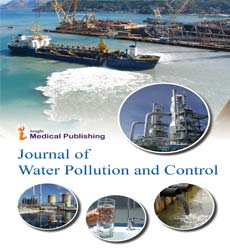Effects, Prevention, and Climate Impact of Water Pollution
Adam Lewis*
Managing editor, Journal of Water Pollution and Control, London, UK
- *Corresponding Author:
- Adam Lewis
Managing editor
Journal of Water Pollution and Control
London, UK
E-mail: lora456@hotmail.com
Received Date: May 18, 2021; Accepted Date: June 02, 2021; Published Date: June 09, 2021
Citation: Lewis A (2021) Effects, Prevention, and Climate Impact of Water Pollution. J Water Pollut Control. Vol. 3 No. 3:15.
Abstract
As a result of rising industrialisation, which promotes urbanisation, the demand on our water environment is getting very great, diminishing the supply of pure water. Polluted water is harmful to aquatic organisms, plants, humans, and the environment, and it affects the ecosystem. All sectors must work together to protect our water environment, which is a key component of sustainable development. While effective wastewater treatment has the potential to save the environment, incorporating environmental policies into the core objectives of the actor firms, as well as on going periodical enlightenment on the current and future consequences of environmental/water pollution, will greatly aid in water conservation.
Introduction
Pollution of our water bodies is a serious hazard to humanity and the aquatic ecosystem, and rapid population growth has accelerated climatic changes. For example, different human activities, as well as the release of greenhouse gases by industry, contribute significantly to global warming, increased global temperature, and decreased atmospheric air quality. Water pollution prevention strategies must be included in the fight for sustainable development. One strategy to drive water pollution prevention is to treat wastewater effectively before it is discharged. Some water pollution remediation climate change mitigation strategies can also be investigated.
Promoting Environmental Sustainability
In any civilization, sustainable development is a means of establishing a high standard of living for the people. It strives to provide solutions to economic, environmental, and societal concerns without jeopardising human and environmental growth in the future; in other words, we must think about the future when making current decisions. There are several examples of urbanisation destroying the environment and jeopardising its survival. Sustainable development takes into account how we live in the natural environment while avoiding harm and damage. One of the most significant issues of urbanisation is sustainability, as most developed and developing societies today consume a significant amount of natural resources on a daily basis. The majority of these resources suit man's needs, yet they are finite. Sustainable development aims to strike a balance between society's competing needs.
Effects and Challenges
Water is a basic requirement of existence that has an evident impact, either directly or indirectly. Water is required for all industrial, environmental, and physiological processes. Water serves a variety of functions in living creatures, including solvent, temperature buffer, metabolite, living habitat, and lubricants. Water, on the other hand, is considered contaminated when some of the water quality metrics have been inhibited by unguided and irregularities caused by a variety of anthropogenic activities, rendering the water unfit for its intended purpose. These contaminants, which enter the water body through a variety of channels but are mostly manmade, have become a major source of concern for environmentalists because of the different risks they represent to the ecosystem.
What Climate Change is?
Climate is usually defined as the statistical description in terms of the average and variability of relevant parameters or quantities of interest over a period of time ranging from days to millions of years, or as the statistical description in terms of the average and variability of relevant parameters or quantities of interest over a period of time ranging from days to millions of years. Temperature, precipitation, wind, and other variables are frequently employed. As a result, climate can be broadly defined as the state of the climate system, including statistical descriptions. Climate change, often known as global warming, refers to an increase in the average temperature on the Earth's surface. The human use of fossil fuels, which emits Carbon Dioxide (CO2) and other greenhouse gases into the atmosphere, is widely regarded to be the cause of climate change. Pressures and strain on the Earth's climate system, on the other hand, are having an impact on the planet's surface. Apart from rising surface temperatures, increased and more frequent flooding and droughts, as well as changes in our natural water ecosystem, are all major sources of concern in man's continued survival on Earth.
Open Access Journals
- Aquaculture & Veterinary Science
- Chemistry & Chemical Sciences
- Clinical Sciences
- Engineering
- General Science
- Genetics & Molecular Biology
- Health Care & Nursing
- Immunology & Microbiology
- Materials Science
- Mathematics & Physics
- Medical Sciences
- Neurology & Psychiatry
- Oncology & Cancer Science
- Pharmaceutical Sciences
